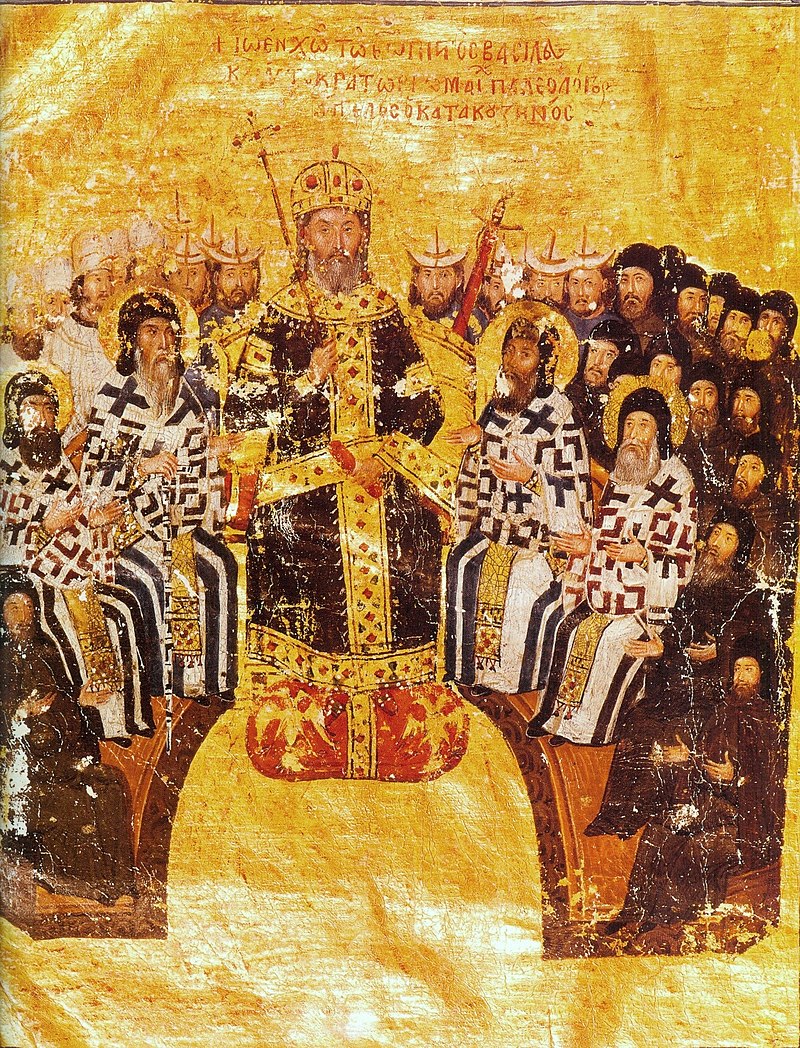 In 1328 the elder emperor abdicated and entered a monastery, and two years afterwards the burial of a monk named Anthony marked the end of the life of Andronicus the Second. Andronicus the Third was now the sole occupant of the throne, which he held until his death in 1341.
In 1328 the elder emperor abdicated and entered a monastery, and two years afterwards the burial of a monk named Anthony marked the end of the life of Andronicus the Second. Andronicus the Third was now the sole occupant of the throne, which he held until his death in 1341.
Reign of Andronicus the Third, 1328–1341.
During these thirteen years (1328–1341) war was constantly being waged against the Turks. The emperor himself was always in delicate health, and died at the age of forty-five. He continued his great friendship until his69 death with Cantacuzenus, and invited him, even as early as 1329, to occupy the throne as co-emperor, and the offer was renewed.52 Cantacuzenus, notwithstanding that he was pressed to accept by the only noble near him in rank, Apocaukus, who afterwards became his great enemy, refused. The emperor, however, continued to treat him as a friend, and was constantly accompanied by him on his various expeditions.
Appeals for aid to the pope.
Like every emperor from the recapture of Constantinople down to 1453, Andronicus turned his attention to the West and sought to obtain aid against the Turks, even at the price of coercing his people into a Union with Rome. The Turks had invaded Macedonia and attacked Euboea and Athens. As the southern portion of the Balkan peninsula was still ruled in part by the descendants of the crusading barons and by the remnant of the Catalans, there was reason to believe that the pope would be ready to arouse the West against the common enemy of Christendom. Accordingly the emperor took advantage of the passage of Dominican missionaries through Constantinople from Tartary to convey to Pope John the Twenty-second his desire for Union and his request for aid. The pope replied by sending preachers and by urging the emperor to do all he could to accomplish his part. His successor in 1335 grew alarmed at the attacks made by the Turks by sea on various places in the Mediterranean, and finding that the Catalans had seized Athens from Gautier de Brienne, who held it as his duchy, he excommunicated them. He invited Andronicus to join the king of France and Naples in a Crusade against the Turks which the Venetians and the Genoese had promised also to aid. The emperor gladly gave his consent and sent a number of ships, but the needs of Cyprus, which was being attacked by the Saracens, were decided to be more pressing than those of the empire, and the Crusade was not proceeded with. Andronicus in 1339 sent Barlaam, the author of many controversial works, to the pope, at that time in Avignon. On his arrival he pointed out that the Turks had seized the seats 70of four metropolitan sees, and he suggested that as a condition of the Union of the Churches the Turks should be expelled from Asia Minor. The pope recognised the desirability of such an attempt as keenly as many of his successors, but saw that the condition was impossible.
Death of Andronicus the Third. Reign of John (1341 to 1391), Cantacuzenus (1342 to 1355.)
Andronicus on his death, in 1341, left a son, John Palaeologus, who was then nine years old. His mother, Anne of Savoy, was a woman of ability and energy. Cantacuzenus was associated with her as regent. He held the dignity of Grand Domestic, and in the later years of his life wrote a clear and able statement of the history of his own times. He had been, as we have seen, the intimate friend of Andronicus and his great supporter when the grandfather of the same name endeavoured to exclude him from the throne. He had been named by his friend and patron as the guardian of John, but the widow of the emperor was from the first jealous of her co-guardian and never worked sympathetically with him. He tells us that from the death of Andronicus he was constantly urged to occupy the imperial throne and that he as constantly refused. He undoubtedly possessed the confidence of a large majority of the nobles. There was a general recognition that, in the existing state of the empire, it was unwise to leave the government in the hands of a boy and of a foreign princess. Ducas expressly states that Cantacuzenus ultimately allowed himself to be proclaimed emperor because his friends urged him to take the reins of government from the hands of a woman and a child and because the empress and the senate were unjust and unfair to him.53 In 1342 he was proclaimed joint emperor under the style of John Cantacuzenus.
During the thirteen years of his reign, which lasted till 1355, the history of the empire is in the main one of civil war and consequent decadence. Distrusted by Anne, the mother of the boy emperor, his difficulties were increased by the turbulent character of his ward, whom his mother could not, or would not, restrain from wilfulness which led him even in early youth into debauchery. The result was that 71during the whole of Cantacuzenus’s reign there was a constant strain between the elder emperor, on the one side, and the empress and her son on the other. Cantacuzenus states that Apocaukus, the noble next to himself in rank, had suggested to him that he should assume imperial authority and that he had rejected the suggestion as treason to the empress and her sons and to the memory of the emperor. But Apocaukus, with the support of the patriarch, soon formed a party, nominally for the empress and her son, really against Cantacuzenus. The patriarch himself claimed to be the guardian of the infant John, excommunicated those who abandoned him, and even Cantacuzenus himself.54 The account given by the emperor of his reluctance to accept the crown might be regarded with distrust if Nicephorus Gregoras, who after he had become a bitter enemy wrote his history of the events of the reign, were not on this point in substantial accord with Cantacuzenus. Even before his accession the troops, according to Gregoras, declared that they would recognise no other regent than the Grand Domestic, and proposed to make the oath of fidelity to the young emperor and his mother conditional upon the recognition of Cantacuzenus as tutor of John and regent of the empire.
In presence of the opposition of Anne, Cantacuzenus offered to resign, but the empress desired that he should remain, probably fearing revolt in case his resolution was carried into effect. Among much which is doubtful, it is clear that he had the confidence of the army and that the empress had not.
Civil war soon broke out between the new emperor and the partisans of John and his mother. Apocaukus was named governor of Constantinople by Anne and excited the population against Cantacuzenus apparently with the intention of having himself elected emperor by a popular vote.
Meantime the rivalries of these two nobles allowed foreign enemies to make progress. Two divisions of Turks were ravaging the empire in one direction, while a band of 72 Tartars who had crossed the Danube had advanced as far as Didymotica. Stephen of Serbia had already marched southwards and was rapidly consolidating the strength of his country. In 1344 the discontent at the civil war had become so great that the nobles insisted that the empress Anne and Apocaukus should send an embassy to Cantacuzenus to make peace. When this attempt failed, Apocaukus, according to Cantacuzenus, endeavoured on two occasions to have him assassinated. Driven thus to extremities, the emperor promised his daughter Theodora in marriage to the Turk Orchan, the son and successor of Othman, who thereupon sent an army of five thousand men to assist in the struggle against the partisans of John.
Apocaukus had thrown into the prisons of Constantinople the partisans of his rival and had ordered them to be treated with unusual barbarity. He was then incautious enough to venture into prison among them. They fell upon him, slew him, stuck his head upon a spike, and showed it to the citizens. Next day, however, at the instigation of his widow, the prisoners were all killed.
Marriage of Sultan Orchan and the daughter of the emperor.
In 1346 Orchan was married to Theodora, the daughter of Cantacuzenus. Her father had stipulated that she should be allowed to remain a Christian, and the agreement was not violated. She was delivered at Selymbria to the escort of Turkish cavalry which had been commissioned to accompany her. Amid much pomp and ceremony, with music, torches, and display of various kinds, the first imperial princess of the Orthodox Church was handed over to the eunuchs of her barbarous lord. We may pass over the father’s excuses for consenting to this marriage, which doubtless appeared to many of his subjects a gross act of wickedness. All that they amount to is that he believed the necessities of state required him to obtain the aid of Orchan and that it could not be obtained in any other way.
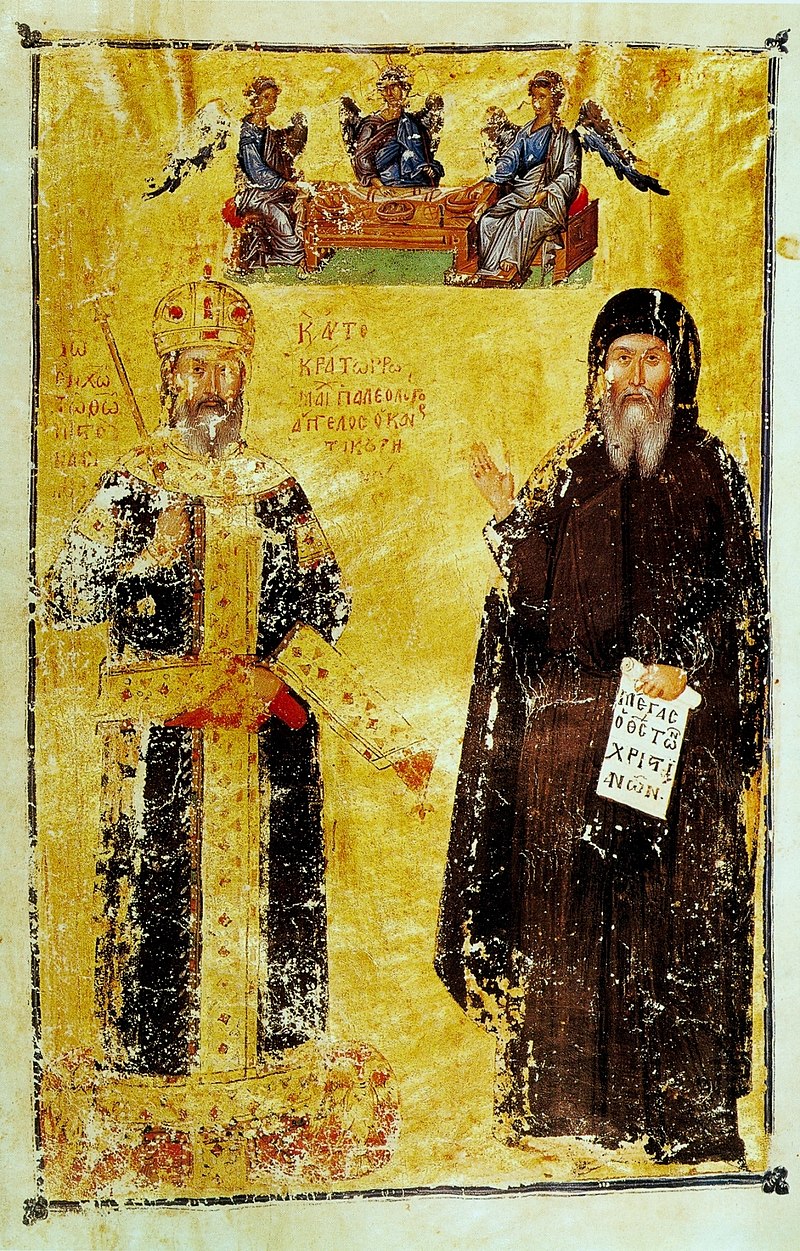 Marriage of the emperor John to another daughter of Cantacuzenus.
Marriage of the emperor John to another daughter of Cantacuzenus.The next year, a much more promising marriage took place, namely that of his daughter Helen with the young emperor John Palaeologus. It had been brought about in the following manner. Cantacuzenus had approached the73 capital, and though the empress had been warned that he was in the neighbourhood, she had taken no precaution to prevent his being admitted, believing, indeed, that the story of his being near was an invention to gain time so as to prevent the condemnation of a new patriarch who was known to be a partisan of Cantacuzenus and was then on his trial before a Council of the Church. The friends of Cantacuzenus were in possession of the Golden Gate and opened it to him and his band of a thousand trusted followers. He marched in triumph to the Palace of Porphyrogenitus. The empress, as soon as she heard of the entry, shut herself up in the Palace at Blachern and called to her aid the Genoese of Galata. When the latter saw that the population were on the side of her rival, they refused to aid her. John advised his mother to treat, and after considerable hesitation she consented and articles of peace were agreed to. An amnesty was to be granted by both sides, and John was during ten years to permit Cantacuzenus to be the dominant ruler. Thereupon the latter proposed that his daughter Helen should become engaged to John, and, though the young man was unwilling, his mother accepted the arrangement. Helen was thirteen years old and her proposed husband fifteen.
Peace and prosperity appear to have been anticipated from the cessation of civil war which it was hoped this marriage would produce. Europe, if not, as Gibbon asserts, ‘completely evacuated by the Moslems of Asia,’55 was yet at peace with the empire. Within its borders all parties were supposed to be reconciled, and at the church of Blachern (the bema of Hagia Sophia having been destroyed by an earthquake) a remarkable coronation service was held in May 1347. Two emperors, namely the young John Palaeologus and John Cantacuzenus, and three empresses—Helen, wife of the Palaeologus, Irene, wife of Cantacuzenus, and Anne of Savoy, the dowager—were crowned with 74unusually elaborate ceremonial. The bystanders, however, noted that the jewels were many of them false and the trappings of far less value than had previously been displayed on similar occasions.
Ducas notes that the young emperor, who had been forced to marry the daughter of Cantacuzenus, instead of taking part in the manly exercises of arms which were still practised by the youth of the empire, plunged into debauchery and soon disgusted his adherents by his drunkenness and by the depravity of his private life. The narrative of Gregoras declares that John complained bitterly of having been insulted by his father-in-law, and the statement is probably true that, seeing his debauchery, Cantacuzenus urged him to lead a better life and devote himself to duty.56
Pressed as he was for money in every direction, Cantacuzenus endeavoured to obtain it by a popular vote. The notice of the incident is almost unique in the later history of the empire and on that account merits attention. Cantacuzenus himself tells its history. Finding that the state had been greatly weakened by civil war, that the treasury was empty, the cities reduced to poverty by domestic divisions or by the invasions of the various foreign enemies who had ravaged the country, and his own private fortune expended, he determined to summon a meeting in Constantinople of the wealthy classes in order that they should contribute to the public necessities. He expressly states that he had no intention of making a levy by force. In the meeting thus called together there were representatives of all ranks—soldiers, shopkeepers, artisans, heads of monasteries, and priests. Cantacuzenus in addressing it declared that he had no desire to act against the Palaeologi but recognised that the civil war had exhausted the treasury, and promised that the money collected would be employed and his efforts directed against the attacks of Serbians, Bulgarians, and Turks. He added that it was not he who had sought the alliance of the Turks, though he had given his daughter in marriage to Orchan, but that the aid of these barbarians had 75been forced upon him by his enemies within the empire. The partisans of John had been the first to ask the Turks for assistance. They had delivered cities to the Turks, had paid them, and had made it necessary that he, in his own defence, should ask for their alliance. He concluded by urging the great assembly to consider in what manner means might be found of preserving the empire.57
The nobles returned answer that they recognised the necessity of contributing for the safety of the state, and advised that every person should give what was in his power. The emperor, believing that he had accomplished his purpose, then dismissed the assembly.
Very little result appears to have been produced. Nor does the voluntary taxation appear to have yielded any considerable sum. In the meeting itself there were many who were opposed to Cantacuzenus personally, and within a short period the animosity between the partisans of the two emperors became as rancorous as ever. Among the most violent of his own partisans was his son Matthew, who, under the belief that Anne, the empress-dowager, was conspiring against his father, boldly took possession of several cities.
Wearied out by constant struggle, Cantacuzenus states that he wished to abdicate and retire to a monastery, and that his wife approved of his design. His writings show that he felt great interest in the discussion of theological questions. The part which he himself took in several religious controversies, the anxiety that he underwent to have the excommunication against him annulled, first by the Patriarch John and afterwards, ‘for greater safety,’ by John’s successor,58 Isidore, his negotiations with the pope for Union, and many other circumstances, show that the withdrawal to a monastery was a not unnatural development of his life.
While he was making preparations to carry his design into execution, news came of the progress of Stephen of Serbia, which forced him to postpone it. Salonica, ‘one of 76the eyes of the empire,’ was in danger of surrendering to Stephen. The partisans of the Palaeologi among the population of that city were numerous. The neighbouring country was, however, under the power of the great Serbian, and unless Stephen were checked without delay the city would be given over to him. The old emperor sent word to his followers to remain steadfast, promising that he would come to their relief. In order to do so, he took a step which is sometimes incorrectly treated as the first important introduction of the Turks into Europe.59 He induced his son-in-law, Orchan, to send a body of twenty thousand cavalry, under his son Suliman, across the Dardanelles to march against Stephen. The emperor left the capital as soon as he had heard that the Turks had crossed the straits to co-operate with them, and took his co-emperor John, who was obnoxious to the Turks, with him. For some reason which is not clear, the Othman or Ottoman Turks withdrew after they had crossed the Maritza, but the two emperors with another body of Turks went to Salonica and put an end to any design to surrender it. This was in 1349.
The history of the empire during the next six years is a medley of incidents, due to the hostility between the two emperors. John refused to address his elder colleague as emperor, and even proposed to join Stephen of Serbia, whose power in the Balkan peninsula was now greater than that of any other ruler. The Bulgarian king, appealed to by Cantacuzenus to enter into alliance against Stephen, refused his co-operation, and shortly after joined the Venetians to attack the empire.
Genoese and Venetians.
Cantacuzenus asked for the aid of the Genoese, who joined him in order to resist the Venetians. The rivalry during this reign between the two republics of Venice and Genoa was great. Each was at the height of its power, and 77the commerce and dominions of the empire were the principal objects of their rivalry. A hundred and fifty years earlier there had been colonies of Amalfians, Pisans, Anconans, Ragusans, and even Germans, within the walls of the city. All these had disappeared,60 and Genoa the Superb and Venice, Queen of the Seas, were the sole Italian competitors for domination in or a share of the empire. At the period with which we are concerned they were about equally matched in strength, and the two brave republics were constantly fighting the battles of their great duel in the waters of the Greek empire. Within a few months the Genoese were alternately the allies and the enemies of Cantacuzenus. In 1350 a fleet of fourteen Venetian galleys, and another of Catalans, prevented the Genoese from entering the Bosporus. Two years later another formidable fleet of Venetian galleys joined one of twenty-six Spaniards in order to attack the Genoese. After Pisani, the Venetian admiral, had rested his men for two days on the island of Prinkipo, he joined the imperial ships at Heptaskalion, and with a fleet of sixty-eight vessels attacked the Genoese. The fleet of the latter, numbering seventy ships, was at Chalcedon, and tried to intercept the enemy when they endeavoured to make their way to the Golden Horn. In a battle which was fought at the mouth of the Bosporus while a strong south wind was blowing with a heavy sea—a battle which continued all night—both sides lost heavily. Eighteen Genoese ships were sunk. Pisani withdrew to Therapia, with a loss of sixteen ships. Galata, held by the Genoese, was not attacked, on account of the prevalence of Black Death, or possibly because he heard that seventy or eighty other galleys were on their way to aid the Genoese.
Immediately afterwards the Genoese joined with the Turks, and transported across the Bosporus a body of them to attack Constantinople. Cantacuzenus, in consequence, was obliged to make peace with his rivals in Galata by allowing them to include a large portion of additional territory within new walls,62 as well as to take possession of Selymbria and Heraclia in Thrace. The Genoese thereupon once more became his allies. Orchan was ready to assist him, and again promised to send twenty thousand Turks to resist the party of John.
Once more Cantacuzenus endeavoured to come to terms with his colleague. The latter had also endeavoured to gain the aid of Orchan, but failed. John’s reply to the overture of his father-in-law was again to refuse to recognise that he had any right to the title of emperor. The followers of the rival emperors, Cantacuzeni and Palaeologi, were more bitter in their opposition than the leaders themselves, and the former in 1353 proclaimed Matthew, the son of Cantacuzenus, co-emperor with his father.
It is clear from the statement of Cantacuzenus himself that, as John grew older, his own party became weaker. The hopes of the people and of the nobles for a peaceful reign had been disappointed. Instead of having peace, the country had been disturbed by civil war. Serbia and Bulgaria had both recovered strength. The Turks had encroached on the imperial territories.
The emperor’s greatest offence was rightly considered to have been the employment of Turkish auxiliaries, and the permission granted to the captors to sell the captured Christians as slaves, or the inability to prevent them from doing so.63 The patriarch Philotheus remonstrated with him on this account, and Cantacuzenus declares that he 79received the admonition as the voice of God, and promised to conform to it.64 Probably because he recognised that his own popularity was waning, he had allowed his eldest son, Matthew, to be associated with him in the government, but though the son displayed great activity, and gathered round him a strong party, both he and his father were condemned by the popular judgment.
The account given by Cantacuzenus is that he was asked by the nobles to nominate his successor, that he deferred giving his answer, but went to consult the patriarch, who retired to a monastery and after a week sent word that he would not return to the court nor to his church unless the emperor would swear never to proclaim his son Matthew. Thereupon Cantacuzenus called together the senate, who declared for Matthew. Cantacuzenus protests that in the struggle going on between John, his son-in-law, and Matthew he was always neutral, but that as the nobles wanted the latter he consented to name him as his colleague and successor. Thereupon Matthew was allowed to wear the purple buskin and the other imperial insignia. His name, as well as that of his father and Anne, the mother of John, was mentioned in the public prayers, while that of John was omitted.65 The patriarch, however, remained obdurate. Matthew had not yet been consecrated. An assembly of bishops declared that, notwithstanding the patriarch’s opposition, he ought to be asked to perform the ceremony. The answer of Philotheus was to decree excommunication against any one who should attempt to lay upon him such a duty. The patriarch was threatened with dismissal. He replied that he would be glad of it, and was dismissed accordingly.66
The great anxiety of Cantacuzenus until, and even after, his abdication was to see his son recognised as emperor. Matthew, however, fell into the hands of John, who generously offered him his liberty on condition that he would renounce all claim to the throne. Cantacuzenus states that he counselled his son to accept this offer. After 80some hesitation he took his father’s advice. Articles of peace were accepted, and among the stipulations it was provided that Matthew might wear any buskin he liked except in purple. It was a relief to both parties when John saved himself from the reproaches of his father-in-law by leaving for Italy and Germany. His party appears to have increased in strength during his absence.
He remained abroad for two years. On his return he encountered at Tenedos a Genoese adventurer, with a considerable number of followers, who was on the look-out for an island which he might seize as the Venetians had seized Chios. John proposed to employ the adventurer to aid him in becoming sole emperor. They came together to Constantinople, where the citizens had already risen in revolt against Cantacuzenus, who had in consequence to shut himself up in the Blachern Palace with a foreign guard. During the night John’s friends asked to be admitted at the postern of Hodegetria, pretending that they were merchants with a cargo of olive oil, and that the sea was rising and dangerous. They promised the guardians that if they were admitted half the cargo should be paid for the favour. They rushed the postern as soon as it was open, and two thousand men entered the city, took possession of the walls, and made a demonstration in favour of John. When morning broke, the Hippodrome was crowded with citizens, and the city in Cantacuzenus submits and retires to Mount Athos, 1355.a tumult. Cantacuzenus apparently lost his head, entered the monastery of Peribleptis, and assumed the habit of a monk. He at once made submission to his young rival, asked and, after some weeks, received permission to retire to Mount Athos, and there passed nearly twenty-five years in the composition of his voluminous History. He died in 1380.
Cantacuzenus, like his predecessors, looked to the West and especially to the pope to aid him in checking the progress of the Turks. Throughout the whole of his reign 81the attempts to obtain aid from the West and to bring about the Union of the Churches, two objects which had become inseparable, are constant. The zeal with which successive popes sought to obtain the Union found a ready response in Cantacuzenus.
News travelled slowly from the Levant to Italy, but such as reached the West made it known, not merely that Moslems were encroaching on Christian territory; that the victories obtained in the great crusades had largely become fruitless; that almost every inch of territory which had been won in Syria at the sacrifice of so many lives and so much treasure had been captured by the infidels, but that the Christian populations had been everywhere treated with the barbarity that has always followed Moslem conquest. The history indeed of Egypt, Syria, and Asia Minor had been a long series of massacres, culminating perhaps in that of Egypt where in 1354, when the Christians were ordered to abjure their faith and to accept Mahometanism and refused, a hundred thousand were put to death.68
Attempts by pontiff (a) to resist Moslems, (b) to effect union.
Under such circumstances, Clement the Sixth was not less anxious than his predecessors had been to check Moslem progress. Encompassed as he was with a host of difficulties, and insecure even in his own position, he constantly kept before him the desirability of attaining the two results which for nearly three centuries were prominent objects of papal policy: resistance to the Mahometans and the Union of the two great Christian Churches. In 1343, the year after his appointment to the pontifical throne, he persuaded the queens of Sicily and Naples to send a fleet with one fitted out by himself against the Turks. Two years later he urged all Christians to aid in the defence of Caifa and, in return for their services in defending that city, permitted the Genoese to trade with the infidels at Bagdad. When he learned that the Christian expedition which he had authorised was massacred by the Turks near Smyrna, he proclaimed a crusade and appealed to Edward the Third of England not to prevent Philip of France from taking 82part in it by making war against him, an appeal which was unsuccessful and which was followed six months later by the victory of Crécy. In the same year Clement sent two nuncios into Armenia to persuade the members of the ancient Church of that people to enter into union with Rome. In 1347 he wrote to congratulate Stephen of Serbia on his having expressed the desire to enter the Roman Communion.
During the early years of the reigns of John and Cantacuzenus, Clement does not appear to have had direct communication with Constantinople. He had apparently a dislike to or prejudice against the elder emperor, for in 1345 he wrote to the dauphin of France not to treat with Cantacuzenus but only with the Dowager Empress Anne.69 He had seen with indignation the employment of Turks by Cantacuzenus against his enemies and considered him a usurper of the throne which ought to be occupied only by John, the son of a mother whose predilections in favour of Union were well known. His information, according to the emperor’s narrative, was derived from an Italian lady who had lived with the Empress Anne and whose sympathy would naturally be with the cause of her mistress.
Cantacuzenus determined to explain to the pontiff his own position, to justify his conduct and at the same time to offer his aid in any expedition that might be formed for attacking the Mahometans and to express his desire to accomplish the Union of the Churches.70
Accordingly he sent a deputation to Clement consisting of the protovestarius and an Italian in his service who was known to the pope. On their arrival they had long interviews with Clement and were astonished at his detailed knowledge of the condition of the empire. According to Cantacuzenus, the pope expressed great satisfaction at the clemency shown by him to his enemies and especially at the marriage between his daughter and John, in which he saw the prospect of a united empire and one which would be able to aid in resisting the Moslems. Clement sent the 83deputation back to Constantinople accompanied by two bishops as nuncios distinguished alike by their piety and learning. They arrived in the capital in 1347. After expressing the satisfaction of the pope for the emperor’s moderation towards his enemies and his kindness towards Anne, the nuncios declared that the pontiff was even more zealous than any of his predecessors for an attack upon the Turks and that he had already endeavoured to induce the Italian princes to join in an expedition by promising them aid in men and money, but that his zeal was still further increased by the offer of the emperor to aid in such undertaking. If in addition to this he could procure the reconciliation of the Churches, he would gain the approval not only of the pope but of God and His angels.
Cantacuzenus in his reply expressed his thanks to the pontiff for his promised aid against the infidels and in reference to the Union of the Churches declared that he would willingly die if by his death he could secure the object for which both ardently longed. He pointed out, however, that the differences between the Churches related to doctrine, and that Catholic teaching recognised that these could only be settled by a Council of the whole Church. He himself could accept no new dogmas nor force others to accept them before they had been definitely accepted by a Council. He therefore suggested that one should be called, being confident that its deliberations and its decisions would receive divine guidance. As the pope could not come to Constantinople and Cantacuzenus could not go to Rome, the emperor proposed that the Council should be summoned to meet in some maritime city, midway between the two capitals.
The nuncios found, or professed to find, the proposal of the emperor reasonable, and returned to Rome. The pope expressed his satisfaction, but declared that he could not suggest a place of meeting till he had communicated with the princes of the West. After some time he sent word that though he regarded the Union of the Churches as the most important question with which Christendom had to84 deal, he was obliged to defer fixing the time and the place for the Council until he had secured peace among the Italian princes. The death of Clement, in 1352, delayed the execution of this project.
Character of Cantacuzenus.
It is difficult to form an impartial judgment of the characters of Cantacuzenus and John, whose reigns cover the period during which, if it had been possible, the empire might have recovered its strength. The history of the reign written by the former, as well as the narrative of Ducas, places the conduct of the elder emperor in a favourable light. The charge most commonly brought against him, of having introduced the Turks into Europe, can only be accepted with considerable reserve. As we have already seen, he was not the first to introduce them. The Spaniards must bear the responsibility of this charge. Once it became necessary to fight, whether against Serbians, Bulgarians, or internal enemies, an emperor can hardly be blamed for obtaining auxiliaries. The mercenaries most easily obtainable were the Turks. All contending parties in the Balkan peninsula were ready to accept their aid. The excuses of Cantacuzenus are evidence which proves that he realised the danger of their obtaining a permanent foothold in Europe. A more valid justification is furnished by the fact that, with the object of preventing them crossing into Thrace without his permission, he endeavoured to close the two passages which they had been accustomed before his time to employ—namely, from Lampsacus and between Sestos and Abydos.
When his own conduct during the time of their joint emperorship is compared with that of John it is seen that in love of country, in devotion to its interests, as well as in sagacity, he is greatly his superior. The difficulties that arose between them were in fact largely due to the jealousy, weakness, debauchery, and incompetence of John. When a youth he was simply a drunken reprobate. That a young emperor, who believed that he had been supplanted by another in his right to the sole occupancy of the throne,85 should resent references to his profligacy and his irregular life was natural enough, but Cantacuzenus cannot justly be blamed because he refused to surrender the government into his hands.
Our estimate of the character of Cantacuzenus has to be based mainly on his own writings. But through them we know the man better perhaps than any other emperor. When dealing with events illustrating his own motives and conduct, he is an unconscious hypocrite. He gives us his version of all the principal events of his reign. His despatches and his speeches are reported at weary length, but they usually leave the impression of having been revised and modified by the light of his subsequent experience. His own narrative is confirmed to a considerable extent by that of Ducas, who, however, is open to suspicion as a partisan. His grandfather had belonged to the party of Cantacuzenus and had escaped into Asia Minor to avoid the vengeance of Apocaukus. Ducas describes Cantacuzenus as distinguished by the soundness of his judgment and by his great courage.71
Cantacuzenus is great in accounting for his failures. Judged by his own narrative, which may be described as an apologia pro vita sua, he appears a respectable ecclesiastically minded man of mediocre talent, seriously desirous of the good of the people whom he governed, but anxious, above all, not only to become emperor but to found an imperial family.
The vanity of Cantacuzenus leads him seldom to lose an 86occasion of reporting what friends or enemies say in his favour. When he sent the embassy to Pope Clement the Sixth to explain why he had employed Turks and to propose to render aid to the sovereigns of the West in the expedition which Clement contemplated, he remarks that the pontiff spoke in the highest terms of his moderation and kindness in not having treated his ungrateful enemies with more severity.72 In his many negotiations with Rome he never fails to report expressions complimentary to his own sagacity, character, and conduct. In like manner he records the flattering expressions used regarding him by the Ottoman sultan, expressions which then, as now, are nearly destitute of all meaning, as if they were a serious representation of the sentiments of the writer. He cannot resist pointing out that Nicephorus Gregoras, whose History he declares to be false and malicious, had at one time awarded him unbounded praise.73
When the chief of the Genoese forces which had captured Heraclia and were flushed with victory proposed to attack the capital, Cantacuzenus makes him abandon his design because he knew that it was defended by the emperor, who was the equal in wisdom and experience of any commander of the age.74 It is in the same spirit of self-laudation that he declares that in the struggle with the Serbians before Salonica he had exterminated some by the simple terror of his name and others by his army.75
Reign of John after retirement of Cantacuzenus (1355 to 1391).
John occupied the throne after the retirement of Cantacuzenus for upwards of thirty-five years. A youth largely spent in selfish pleasures gave little promise that the young man of twenty-three would be able to cope with the difficulties by which the empire was beset. With the aid of his mother, Anne of Savoy, and of partisans whose only hope was in the patronage of the new ruler, he had succeeded in ridding himself of his elderly, respectable, and patriotic colleague. He had now to face the difficulties with which the empire was beset. Of these the dynastic struggle which 87still continued with Matthew, the son of Cantacuzenus, was soon disposed of. An agreement had been arrived at before the withdrawal of his father by which Matthew should retain the title of emperor and remain in possession of certain districts of the Rhodope mountains, and of the island of Lemnos. A few months later the island was exchanged for a lordship in the Morea. Shortly afterwards Matthew was made prisoner by the Serbians, delivered to John, and, after he had been kept for a while prisoner in Tenedos, abdicated and retired in 1358 to the Morea.
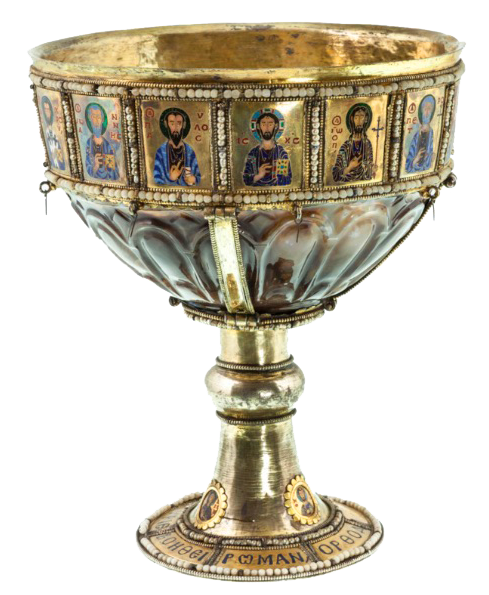 Silver, Gold, Enameled Icon with Lapis & Jewels
Silver, Gold, Enameled Icon with Lapis & Jewels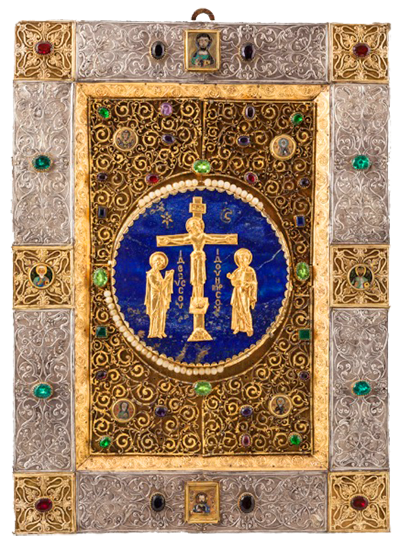
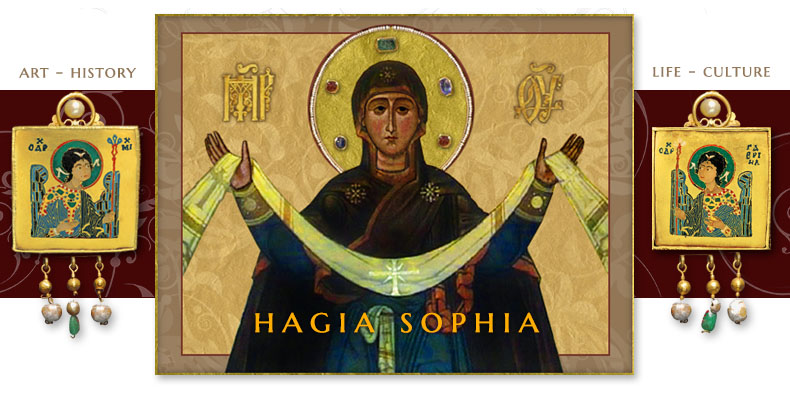
 In 1328 the elder emperor abdicated and entered a monastery, and two years afterwards the burial of a monk named Anthony marked the end of the life of Andronicus the Second. Andronicus the Third was now the sole occupant of the throne, which he held until his death in 1341.
In 1328 the elder emperor abdicated and entered a monastery, and two years afterwards the burial of a monk named Anthony marked the end of the life of Andronicus the Second. Andronicus the Third was now the sole occupant of the throne, which he held until his death in 1341. Marriage of the emperor John to another daughter of Cantacuzenus.
Marriage of the emperor John to another daughter of Cantacuzenus.



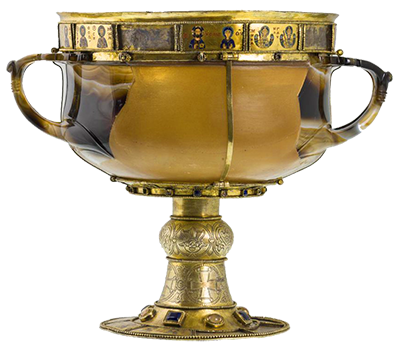
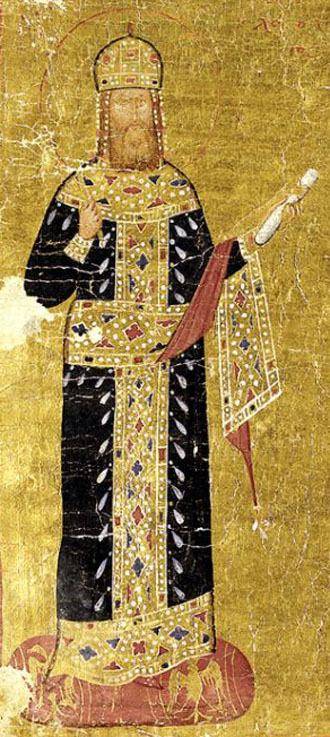
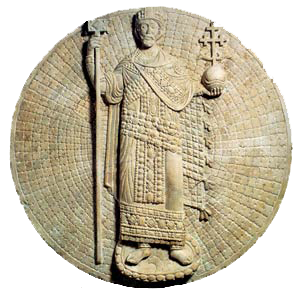
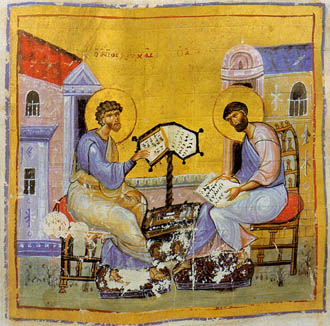
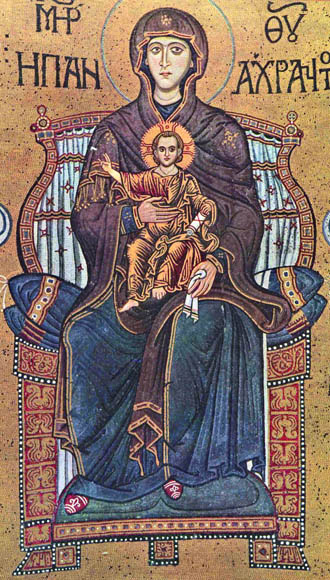
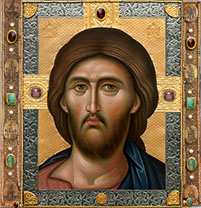 click here for icons of christ
click here for icons of christ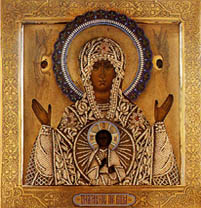 click here for icons of the theotokos
click here for icons of the theotokos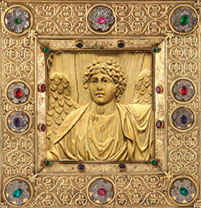 click here for icons of angels
click here for icons of angels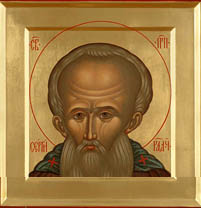 click here for icons of saints
click here for icons of saints








